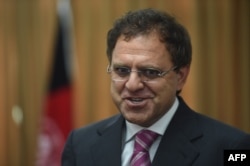The Taliban have denounced Afghanistan and Pakistan for planning to convene a major bilateral conference of religious scholars in a bid to declare the Afghan insurgency as un-Islamic.
An Afghan delegation composed of officials and clerics is visiting Islamabad and holding talks with Pakistani counterparts to prepare ground and an agenda for the proposed conference of "ulemas," or clerics. The deputy head of the government-appointed High Peace Council (HPC), Atta-ur-Rehman Saleem, is leading the Afghan delegation.
The discussions began Friday and continued Saturday, but neither side has shared details. "Both the sides agreed not to speak to media," a senior official told VOA on condition of anonymity.
"The Islamic Emirate [the Taliban] calls on religious scholars in Afghanistan and Pakistan not to attend the meeting and fall victim to America's plots and desist from indirectly cooperating with American invaders," said a Taliban statement issued Saturday.
It alleged the United States is plotting Afghan clerics' meetings with counterparts in other countries to try to build religious opposition to the insurgent group's "ongoing jihad," or holy war, against foreign "occupation" of the country.
'Fake reports'
The Taliban asserted in their statement that the U.S. military mission had failed to defeat the Taliban on the battlefield and that "the invaders" were now resorting to such conferences and promoting "fake reports" about peace talks with insurgents to "cover up their failures" and justify their "occupation" of Afghanistan.
Some religious groups in Pakistan have long voiced support for the Taliban and publicly defended the Afghan insurgency as Islamic jihad. Kabul believes leaders of these groups could use their influence to help reduce violence and promote an Afghan political reconciliation process.
Afghan Ambassador to Pakistan Omar Zakhilwal has underscored the importance of a joint stance by religious scholars of the two countries against the insurgent violence in his country.
"That's needed. It's important and we [Afghans] are ready for it. We would want to, and I hope Pakistani ulemas join hands with us," Zakhilwal said in an interview that state-run Pakistani television aired Friday.
Saudi Arabia and Indonesia have already this year hosted, with Afghan officials, international and trilateral ulema conferences. Participants at these meetings denounced suicide bombings as "actions forbidden in Islam" and urged the Taliban to engage in direct talks with Kabul to end the war.
However, the Islamist insurgency swiftly rejected those declarations and came up with counteredicts from pro-Taliban clerics justifying the war as a religious obligation to evict foreign forces from the country.
While Pakistani scholars attended the trilateral ulema conference in Jakarta in May with Afghan and Indonesian counterparts, they stayed away from the international gathering in Saudi Arabia.
U.S. 'plot' alleged
The Taliban reportedly had sent letters to Pakistani scholars, urging them not to attend the Saudi-hosted conference because it was an "American plot to justify their military invasion of Afghanistan."
Afghan officials allege sanctuaries in Pakistan have enabled the Taliban to sustain and expand their insurgent activities. Islamabad rejects these charges as baseless.
For their part, Pakistani officials blame "ungoverned areas" in Afghanistan for encouraging fugitive militants to shelter there and plot cross-border terrorist attacks.
The allegations and counterallegations are at the center of bilateral tensions between the two countries, which share a nearly 2,600-kilometer border that is largely porous.
Pakistan maintains it has agreed to organize the joint ulema meeting to build mutual confidence and underscore Islamabad's resolve to support the Afghan government's efforts to promote peace in the country.





